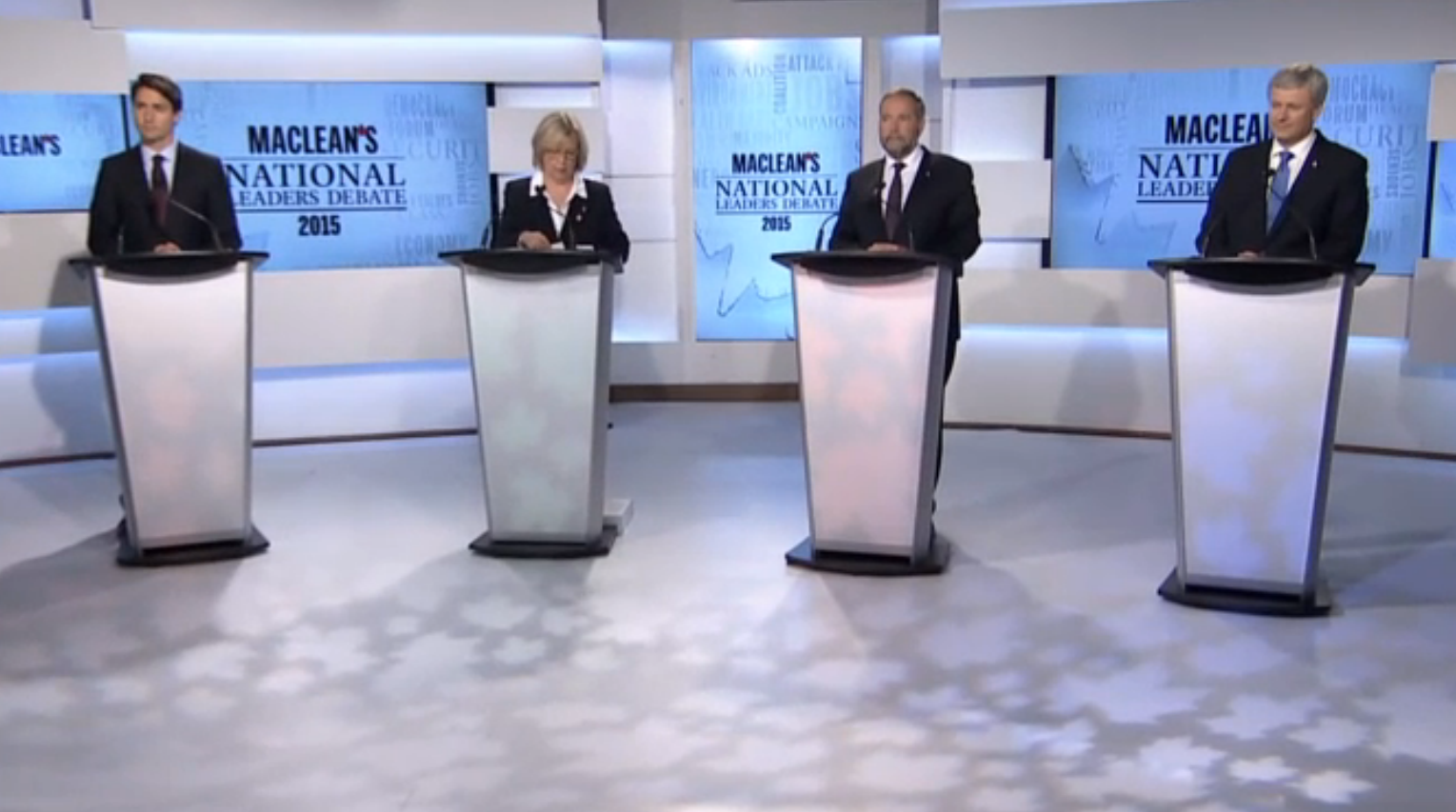Like this article? Chip in to keep stories like these coming.
![]()
Opposition Leader Thomas Mulcair stayed calm, smiled and looked prime ministerial during last night’s “national” televised leaders’ English-language debate — don’t take my word for that. Although I agreed, writers for both the Globe and Mail and the National Post said so too.
Liberal Leader Justin Trudeau not only managed to show up with his pants on, as a much-quoted Tory insider sneeringly proposed as a yardstick for his success in the debate, but landed enough effective blows for several commentators to award him the victory. Can’t say I saw it that way myself, but these events are highly subjective.
Green Party Leader Elizabeth May probably triumphed just by getting permission to be there, and the fact she spoke well, argued coherently and pushed back effectively in a testosterone-rich environment made her look like a winner to me.
And at the end of the night, Prime Minister Stephen Harper was still standing, even sneering a little, which by the weird dynamic of a televised debate seemingly designed to have as little impact as possible — the only kind the prime minister will appear in, apparently — that’s good enough for him and his supporters to call it a victory too.
This morning, all the usual suspects from all parties, plus quite a few in the Peanut Gallery, were spinning the debate as a victory for their leader, and in fact a coherent case can be made that each one won. Given the format, without a math-is-difficult moment, none of it has much meaning, though.
Let’s be realistic, the Maclean’s Magazine sponsored debate was hard to find and seemingly designed to exclude anyone except policy wonks and strategy nerds.
All Harper had to do was fend off the punches and ensure there was no definitive news clip that could be played and replayed showing him being smashed to the mat by any of his three opponents.
Give the man his due. He did that. He never melted down, although it looked like it was hard work at times, and he only sneered a little, which presumably plays well to the Conservative base.
The way I saw it, Harper’s slickly confident answers only faltered a little in the home stretch, when Mulcair finally gave up on his unnerving effort to smile all the time and hammered the PM on the issue of the liberty destroying Bill C-51 and the government’s bias against Muslim Canadians like the prosecutor the Opposition leader is at heart.
If you didn’t come with your own mental briefing book, though, it would have been easy to believe many of Mr. Harper’s answers on most of the issues covered.
Of course, most of the people watching likely did know the issues pretty well, since the whole thing seemed to be designed to discourage undecided voters from tuning in. It was low-key, dull as ditchwater, apparently aimed at the kind of people who watch Question Period on cable, difficult for many to find at more than a single click away on the internet, buried deep on the TV dial and far too early in a campaign most ordinary Canadians will ignore until after Labour Day.
Anyway, decisively winning a political debate really requires a major blunder by one debater, and normally the willingness of another one to follow up with en effective attack. Given the skill level demonstrated by all four of last night’s debaters, if anyone had messed up, someone would have exploited the opening.
In other words, someone needed to say something stupid like, “Math is difficult,” preferably in a tone that implied, “Math is difficult, dear.”
That, for all of you who are not Albertans, was in retrospect the decisive moment in the April 23 Alberta party leaders’ debate, and quite possibly the decisive moment in the campaign that saw Rachel Notley surprise everyone, perhaps even including herself, by being elected premier on May 5. The speaker was Jim Prentice, up to then looking coolly confident and seen by pretty well everyone as Alberta premier for as long as he wanted to be.
Since there were no such dramatically decisive moments in last night’s debate, there’s nothing to play and replay on television showing the prime minister, or for that matter any of the other participants, being humiliated.
In other words, last night everybody won — except Canadians, of course, who need and deserve conventional television debate, high on the dial at an appropriate time. It should tell you a lot about how things work in this country nowadays that we’re not going to get it.
This post also appears on David Climenhaga’s blog, AlbertaPolitics.ca.



